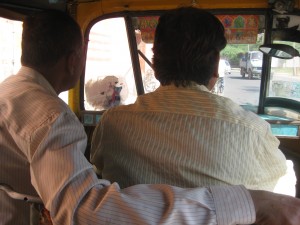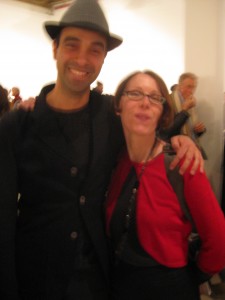In his dialogue Lysis, Plato gives a nice description of a very familiar human experience. Lysis, a young teenage boy, would like to come over to join a conversation that Socrates is having with some others, but he is too timid to do so. When his friend Menexenus arrives, however, he feels able, in the company of his friend, to go over and join the social group.
I have certainly often experienced such situations in which I only feel confident to move into some public activity if I feel “paired up” with a friend. In such situations, my friend lets me feel like I don’t have to expose myself fully to the alien social situation, and that I have a place of refuge with my ally–not somewhere to which I’ll retreat physically, but a psychological point of respite.
 In such situations, it is really the “pair” that is acting. I do my thing only with her: my action is our action.
In such situations, it is really the “pair” that is acting. I do my thing only with her: my action is our action.
Now, let’s do a little counting: how many are here?
We might normally think that I am one person and my friend is another one, so we take one, add one, and get two. Experientially, though, this is not true.
It is only in my friend’s company that I feel myself: experientially, it is the addition of the second that lets me be one for the first time. The experience of the “pair,” in other words, doesn’t fit easily into the system of discrete units presumed by counting.
Many economic and political approaches treat people as if they (we) were just discrete countable units, denying the complexities of these (and other) relationships of interpersonal and social dependency that define our existence.
Politics does that at least when it turns each of us into a single vote, stripping each of us of the complexity and richness of our engagement with the political arena and translating our reality into a simple “yes” or “no” to a policy designed by someone else without our input, and presented to us only as a “take it or leave it” “choice.”
Economics does this when it treats us as a resource for offering 40 hours per week of labour, hours that are themselves each worth a certain number of dollars: all the stuff of a human life becomes a price tag–all of our reality is interpreted as a dollar value, a number.
The political recognition of our individual rights is essential, as is our recognized capacity to participate autonomously in economic life. These recognitions are essential to a free life, but they become the opposite of freedom when there are mistaken for adequate interpretations of human life.
 In our living experiences of intimacy and friendly companionship (and much more besides) we do not live as discrete individuals. Our experience, rather, is of a set of powers, expectations, interests and feelings that arise from a shared situation. We can count–persons, votes, dollars–but that dividing up into units always comes after a living situation is established–a living situation that is continuous and connected where the mathematical units are divided.
In our living experiences of intimacy and friendly companionship (and much more besides) we do not live as discrete individuals. Our experience, rather, is of a set of powers, expectations, interests and feelings that arise from a shared situation. We can count–persons, votes, dollars–but that dividing up into units always comes after a living situation is established–a living situation that is continuous and connected where the mathematical units are divided.
Mathematics is great, but it depends upon a concreteness of incalculable importance that will always exceed its comprehension.


 Participants in these
seminars consistently have the experience of growth in their conversation and
conceptual abilities, and typically leave with a transformed sense of the nature
and possibilities of philosophy.
Participants in these
seminars consistently have the experience of growth in their conversation and
conceptual abilities, and typically leave with a transformed sense of the nature
and possibilities of philosophy.





One Comment
It’s interesting that mathematics provides us with the ability to see beyond what is immediately in front of us, and to derive universal principles that appear to govern that immediacy, yet that it, too, perhaps sends the implicit message that it has provided the last word on the meaning of what is immediate. I happen to find this interesting right now because I am very interested in how explanations – especially very effective ones – seal off the space for additional inquiry in a way that is often counter-productive to education and to thinking in general.